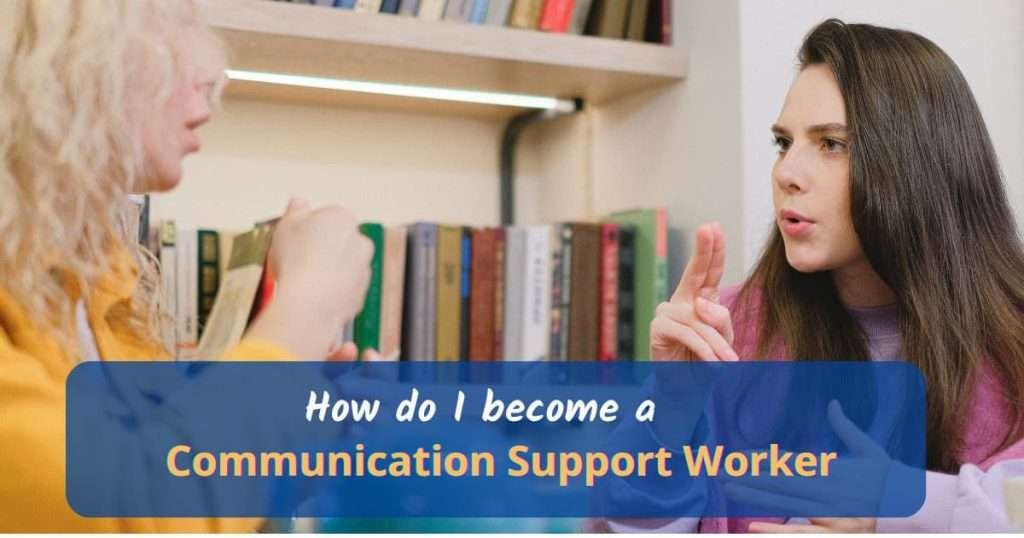“How do I become a Communication Support worker?” is a question that is usually asked by students on a BSL Level 2 or Level 3 course. If you want to use BSL more and enjoy being in a learning environment then being a communication support worker or CSW could be a great career path for you.
A CSW plays a vital role in bridging the communication gap between deaf learners, other students and hearing tutors. In our guide below, we explore the qualifications, responsibilities, and necessary steps to embark on becoming a CSW.
What is a Communication Support Worker?
A CSW’s primary role is to facilitate communication between hearing tutors and deaf students in schools, colleges, and universities.
CSWs are usually paid by the educational organisation because the role is a ‘reasonable adjustment’ under the Equality Act. CSWs ensure that classrooms and courses are accessible to deaf students. They collaborate with various professionals, including teachers, lecturers, other CSWs and any other staff involved in a student’s support.
Qualifications in Communication Support for Deaf People
To provide effective support, it is vital that you have the necessary qualifications in communication support. These qualifications are designed to equip you with the knowledge and skills required to assist deaf people in various educational and work settings.
Signature, the awarding body for BSL qualifications, offers a Level 3 qualification in Communication Support for Deaf Learners, as well as a qualification in Modifying Written English Texts for Deaf People. These qualifications enable CSWs to gain a deep understanding of deaf culture, British Sign Language (BSL), and effective communication strategies.
Whilst these qualifications are available (and recommended), they are not necessary to become a CSW. Many schools and colleges advertise for CSWs who have a BSL level 2 qualification.
Most experts in Deaf education point out that BSL Level 2 is not enough to effectively support a Deaf child who uses BSL. BSL Level 2 is equivalent to a pass (6 – 9) at GCSE. Unfortunately, most students at Level 2 are not sufficiently fluent to be able to handle the complexity of language needed in an educational environment.
To give an analogy, a CSW with a BSL Level 2 qualification supporting a deaf student, is like someone who has just passed their driving test being expected to drive a Formula 1 car. In other words, BSL Level 2 learners are still learning the basics of BSL so ‘support’ from someone with a BSL level 2 qualification would be extremely limited.
Organisations like BATOD recommend that CSWs have a minimum of BSL Level 3 to support a young deaf person in education. Increased fluency and an understanding of linguistics at BSL level 3 can make a real difference for a deaf student accessing the curriculum.
Ideally, CSWs would have BSL level 6 to be truly effective in providing access to education. However, many CSWs with higher qualifications go on to become trainee interpreters because they can command higher hourly fees.
Responsibilities of a Communication Support Worker

As a CSW, you will have a diverse range of responsibilities to ensure you can provide effective communication and support. The key tasks include:
- British Sign Language (BSL): A CSW needs a strong command of BSL to facilitate communication between deaf learners and their hearing peers. Sign language skills will be central to the role
- Sign Supported English: A CSW may need to modify BSL and use Sign Supported English (SSE) in certain situations. SSE combines elements of BSL with spoken English.
- Explaining Complex Terminology: A CSW may need to explain difficult terminology in sign language or written format, ensuring that deaf learners grasp the meaning effectively. They may help in adapting learning materials
- Upholding Policies: CSWs are the same as any other professional and will ensure compliance with school, college or university policies.
- Team Collaboration: CSWs work effectively as part of a team, liaising with colleagues to provide comprehensive support.
- Impartiality and Confidentiality: CSWs maintain impartiality, respect, and confidentiality in all situations, adhering to professional ethics and guidelines.
It is important to note that CSWs are not responsible for completing students’ work, reprimanding them for lateness or absence, teaching or checking their work, or discussing their private information without the student’s consent.
Becoming a Communication Support Worker
If you are interested in pursuing a career as a CSW, the actions you need to take are as follows:
- Deaf Tutor-led Course: Complete BSL Levels 1 – 3 with an Signature approved course provider. CPD qualifications are not accepted as they do not meet government standards for qualifications.
- Signature’s CSW qualification: Some BSL course providers can assess you for the CSW qualification. The assessment would be separate to a BSL language certificate. It would be useful to have the CSW qualification as it provides in-depth knowledge and practical training needed for providing communication support to deaf learners.
- Work Experience and Mentoring: You may already be employed in a school or education environment. Some employers want their CSWs to learn BSL first, then organise mentoring so you can gain the necessary skills to become an effective CSW.
How much does A CSW earn?
Communication Support Worker salaries vary depending on the location of the work and complexity of the subject area that needs communicating in BSL.
The average hourly rate for a CSW is between £15 – £25 per hour.
Schools tend to recruit CSWs as employees. Other education organisations such as colleges and universities often expect CSWs to be self employed so only recruit freelance CSWs. It is important to be aware of this as you’ll be responsible for your own tax and National Insurance contributions. Employed CSWs will have their salaries paid over the 12 months and will include statutory holiday pay. Whereas freelance CSWs are only paid for the hours actually worked.
You also need to be aware that CSW employment is a demand-led service so any service contract is usually for one academic year at a time. This is because a student might change school or college depending on their communication needs.
Once a student leaves, and there is no other student needing communication support, then there is no demand for CSW services so the contract will end. Contracts tend to finish at the end of the academic year and are renewed in September if a deaf student stays on with the education organisation.
Educational Resources for CSWs:
A Communication Support Worker needs access to a range of BSL signs for educational topics.
The Scottish Sensory Centre has a number of glossaries for curriculum topics.
For more difficult topics such as phonics, NDCS provide advice for Teachers of the Deaf
BATOD also provide a number of resources for CSWs including a code of practice.
Employer’s Guide for recruiting CSWs
The CSW code of practice provides guidelines for recruiting CSWs. The guidelines outline the actions employers need to take before, during and after recruiting a CSW.
Career progression for CSWs
Communication Support Workers often progress to become fully qualified Sign Language interpreters. You can do further qualifications such as a deaf studies degree or further sign language training to BSL Level 6. Once you have achieved the appropriate language skills, you can progress to learning interpreting skills needed to become a sign language interpreter.

